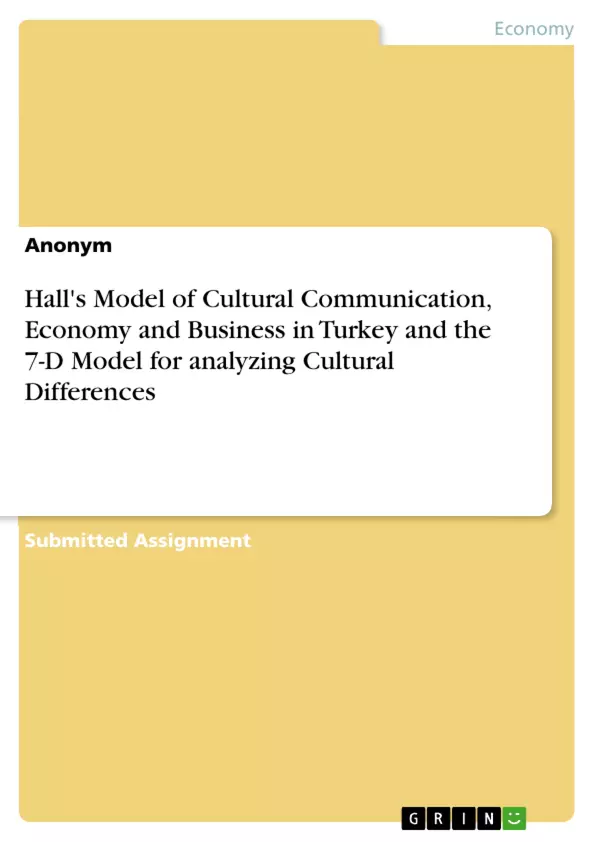This assignment examines Hall's Model of Cultural Communication, economy and business in Turkey and the 7D Model for analyzing cultural differences. First, it uses Hall's model to outline and compare the business culture in France and the United States. Then, it gives a short summary about the development of Turkish economy, as well as a description of major industries and current challenges. And last, it describes Trompenaars' and Hampden-Turners 7D Model with practical examples.
Table of Contents
- Hall's Model of Cultural Communication – Outlining Business Cultures (France/USA)
- Hall's Model of Cultural Communication
- Context
- Space
- Time
- Comparing U.S. and French Business Culture
- Space in the U.S. and France
- Context in the U.S. and France
- Time in the U.S. and France
- Economy and Business in Turkey
- Economy of Turkey - Introduction
- Economic Development and Economic Situation
- Major Industries and Important Companies
- Agriculture
- Industrial Sector
- Services
- Major Companies
- Foreign Trade
- Current Challenges
- The 7-D-Model for analyzing cultural differences
- Hampden-Turner and Trompenaars' 7-D-Model
- Universalism versus Particularism
- Individualism versus Collectivism
- Neutral vs. Affective
- Specific vs. Diffuse
- Achievement vs. Ascription
- Human-Time-Relationship
- Human-Nature Relationship
Objectives and Key Themes
This text explores cultural differences and their impact on communication and business practices, focusing particularly on the comparison of U.S. and French business cultures, as well as providing an overview of the Turkish economy and business environment.
- Hall's model of cultural communication and its application to understanding differences in context, space, and time.
- Analysis of key cultural differences between the U.S. and France, specifically in the areas of context, space, and time.
- An overview of the Turkish economy, including its major industries, companies, and foreign trade.
- Introduction to the 7-D-model for analyzing cultural differences, highlighting key dimensions such as universalism vs. particularism, individualism vs. collectivism, and achievement vs. ascription.
- Examination of the cultural factors impacting business practices in Turkey.
Chapter Summaries
The first chapter introduces Hall's model of cultural communication, which focuses on the role of context, space, and time in shaping communication patterns. The chapter then applies this model to analyze the differences in business cultures between the U.S. and France, highlighting the impact of varying levels of context, space, and time perception on communication and business practices.
Chapter two provides a detailed overview of the Turkish economy, covering its economic development, current situation, major industries, and important companies. The chapter also examines the country's foreign trade and current economic challenges.
Chapter three introduces the 7-D-model, a framework for analyzing cultural differences across various dimensions. This model helps to understand how cultural factors influence behaviors and communication styles, providing insights into potential challenges and opportunities in international business.
Keywords
This text focuses on the key concepts of cultural communication, business cultures, cross-cultural communication, context, space, time, cultural differences, the 7-D-model, universalism, particularism, individualism, collectivism, achievement, ascription, Turkish economy, foreign trade, and economic challenges.
- Quote paper
- Anonym (Author), 2017, Hall's Model of Cultural Communication, Economy and Business in Turkey and the 7-D Model for analyzing Cultural Differences, Munich, GRIN Verlag, https://www.grin.com/document/376002



